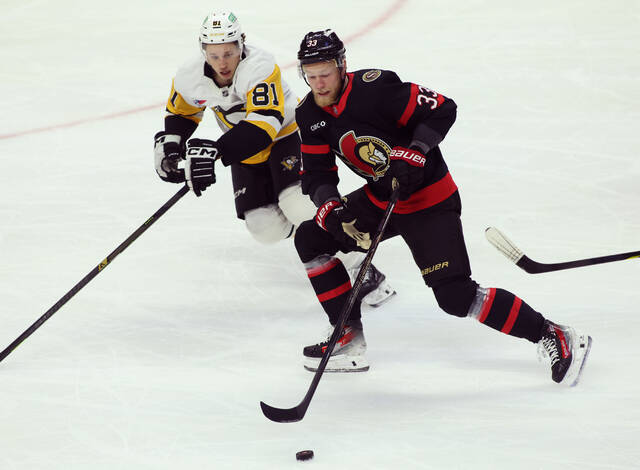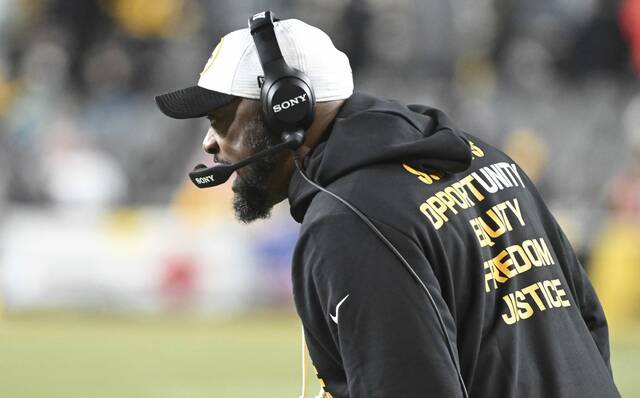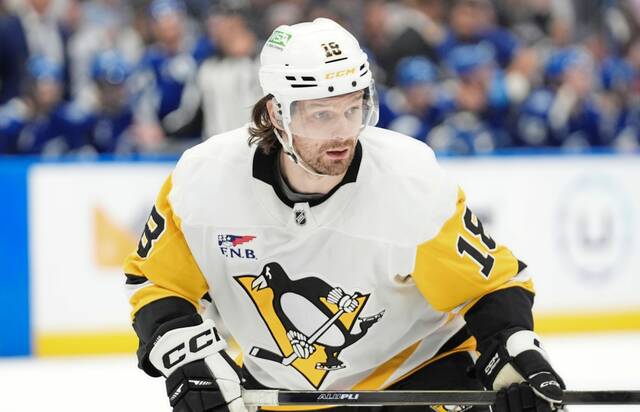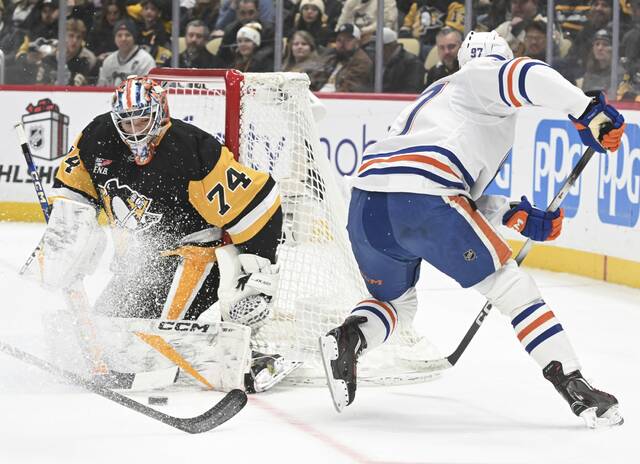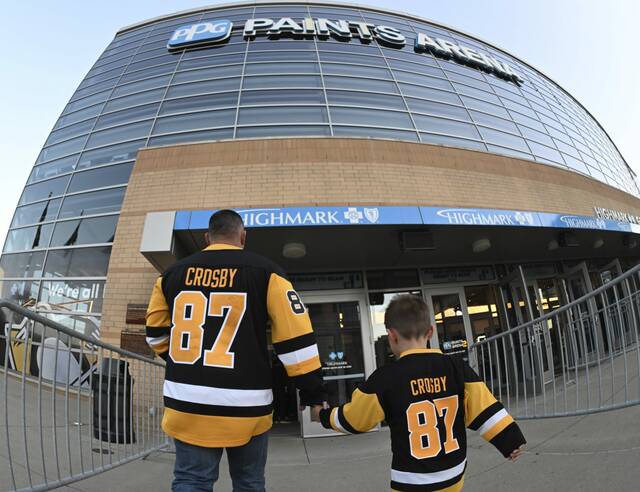While the NHL is on hold because of the ongoing coronavirus pandemic, the Tribune-Review will offer the Double Team project, an examination of the five best players who have contributed substantially to the Penguins and another franchise. For consideration, a player must have played at least the equivalent of a full season for each franchise. (Sorry, Jarome Iginla fans.)
Today, a look at the Ottawa Senators. The original Senators franchise moved to St. Louis in 1934 and became the Eagles. By 1936, during the Great Depression, the Eagles folded. In 1992, the NHL expanded back into Ottawa, and the new franchise took on the Senators name in Canada’s capital.
In 105 all-time games against the Senators, the Penguins have a 58-32-15 record.
1. Shawn McEachern, center
A sixth-round pick in 1987, McEachern took the long route to the professional ranks. After attending Boston University for three seasons, McEachern skipped his senior year to join the United States Olympic team for the 1992 tournament in Albertville, France. Following a surprising run to the bronze medal game, McEachern signed with the Penguins almost immediately.
Debuting in March, McEachern took on a bottom-six role and helped the Penguins secure a playoff spot. In the postseason, he contributed nine points in 19 games and earned a Stanley Cup ring.
During his first full NHL season of 1992-93, McEachern, who could play all three forward positions, played in all 84 games and collected 28 goals as well as 61 points as the Penguins claimed the franchise’s only Presidents’ Trophy as the league’s top overall regular season team.
An offseason trade in August of 1993 briefly sent McEachern to the Los Angeles Kings, but he returned in another trade by February 1994. His final season with the Penguins was the lockout-shortened 1994-95 campaign in which he put up 26 points in 44 games.
McEachern was traded again in August 1995 to the Boston Bruins. After a single season in his hometown, McEachern was on the move again, joining the Senators via trade in June 1996.
With Ottawa, McEachern enjoyed the most sustained success of his career.
Injuries limited McEachern to 65 games and 31 points in 1996-97, but he helped the franchise reach the postseason for the first time that spring.
In all, McEachern spent six seasons in Ottawa, reaching the 20-goal barrier four times, including two 30-goal efforts. The Senators reached the playoffs every season McEachern wore their sweater and even won two division titles during that span. In 454 career games with the Senators, McEachern had 304 points, 11th-most in franchise history.
During the 2002 offseason, he was traded to the Atlanta Thrashers.
2. Patrick Lalime, goaltender
Had Lalime spent more than one season in Pittsburgh, he probably would be the unquestioned top choice for this exercise.
A sixth-round pick in 1993, Lalime made his debut in November 1996 when starting goaltender Tom Barrasso’s season came to an end after five games because of an injury.
Largely platooning with Ken Wregget, Lalime quietly recorded his first win by making 16 saves in a 5-3 road win against the Washington Capitals on Dec. 6, 1996. No one realized that would be the first step in Lalime making NHL history.
Over the next month and change, Lalime would break a record set by the legendary Ken Dryden for the longest unbeaten streak to open an NHL career and went 14-0-2 in his first 16 games.
In all, the 22-year-old Lalime went 21-12-2 with a 2.95 goals-against average, a .913 save percentage and three shutouts, finishing fifth in voting for the Calder Memorial Trophy, which recognizes the NHL’s top rookie.
A contract holdout ended Lalime’s tenure with the Penguins, however. Spending the entire 1997-98 season in the International Hockey League with the independent Grand Rapids Griffins, Lalime saw the Penguins trade his NHL rights to the Mighty Ducks of Anaheim in March 1998.
Lalime failed to impress Mighty Ducks management and never played at the NHL level for that organization. In June of 1999, he was on the move again, dealt to the Senators.
Initially used as a part of another platoon with the Senators in 1999-2000, Lalime earned the starting role by 2000-01 and manned Ottawa’s net for the next four seasons.
Lalime’s signature season of 2002-03 saw him earn his only selection for an All-Star Game while posting a 39-20-7 record with a 2.16 goals-against average, a .911 save percentage and eight shutouts while helping the Senators win the Presidents’ Trophy.
Unfortunately for Lalime, he became the face of postseason futility for a franchise that never got past the Eastern Conference Final during his tenure, and during the 2004 offseason, he was traded to the St. Louis Blues.
Lalime still holds the franchise’s career record for shutouts with 30.
3. Randy Cunneyworth, left winger
An eighth-round pick in 1980 of the Buffalo Sabres, Cunneyworth failed to catch on with that organization but found ample opportunity with the Penguins after being traded to Pittsburgh in October 1985.
Lined up occasionally with franchise center Mario Lemieux, Cunneyworth put up 15 goals and 45 points in 75 games as a rookie in 1985-86.
A physical player who could skate well, Cunneyworth enjoyed four productive seasons with the Penguins, including a career-best 35-goal effort in 1987-88.
After helping the Penguins reach the postseason for the first time in seven years in 1989, Cunneyworth was traded to the Winnipeg Jets during the ensuing offseason. He bounced between the Jets, Hartford Whalers and Chicago Blackhawks before joining the Senators as a free agent in June 1994.
Following the NHL’s lockout, Cunneyworth was named captain and steered the franchise out of its clumsy embryonic stages into playoff contention by 1996.
Appearing in 276 of a possible 292 games during his four seasons with the Senators, Cunneyworth recorded 95 points and 360 penalty minutes.
During the 1998 offseason, he rejoined the Sabres as a free agent.
4. Janne Laukkanen, defenseman
The Senators plucked Laukkanen — a middling eighth-round pick in 1991 — out of the Colorado Avalanche’s system with a minor league trade in January 1996. Under the tutelage of coach Jacques Martin, Laukkanen, an unimposing 6-foot, 196-pound Finn, became a steady, reliable defenseman who helped the Senators become a regular playoff contender in the late 1990s.
Breaking through as an NHL regular in 1996-97, Laukkanen, who was never afraid to hit anyone in a different jersey, recorded 21 points in 76 games, helping the Senators reach their first postseason.
In total, Laukkanen spent parts of five seasons as a reliable defensive presence on the blue line in Ottawa before being shipped to the Penguins at the 2000 trade deadline.
The primary benefit of the trade from the Penguins’ perspective was to unload Barrasso’s contract. And the most celebrated player they received in the transaction was goaltender Ron Tugnutt, who offered an inspired effort during the 2000 postseason. But Laukkanen was the only one of the three players in the deal who lasted more than one season with his new team.
Primarily used as a second-pairing blue liner, Laukkanen was a steady and physical defender who offered a little offense. His best season in Pittsburgh came in 2000-01 when he appeared in 50 games and contributed 20 points to a team that reached the Eastern Conference Final.
Eventually, Laukkanen’s willingness to play physical took its toll and wore out his body. By the 2003 trade deadline, he was dealt to the New York Rangers in a multi-player trade, which was essentially another salary dump for the Penguins.
5. Sergei Gonchar, defenseman
Gonchar is more or less on this list by default. His time with the Senators was hardly the high point of his career. But there aren’t many other options.
Leaving the Penguins as a free agent in July 2010, Gonchar spent three seasons in Ottawa. Playing for a team that was focused more on defense than anything else, Gonchar could muster only 27 points in 67 games in 2010-11 as Ottawa missed the playoffs.
After Paul MacLean took over as coach in the 2011 offseason, the Senators were more aggressive on the ice, and Gonchar enjoyed a bit of a surge offensively, recording 37 points in and 74 games as the Senators returned to the postseason.
During the lockout-shortened 2012-13 season, Gonchar picked up the slack for injured star defenseman Erik Karlsson and put up 27 points in 45 games.
The enusuing offseason, he was traded to the Dallas Stars.
Of course, Gonchar’s brightest days were with the Penguins. Following the 2004-05 lockout, the Penguins’ first major signing was Gonchar, and they inked him to a then-monster five-year deal worth $5 million per season.
As the Penguins stumbled through the 2005-06 campaign and missed the playoffs, Gonchar drew the ire of fans because of his salary despite putting up a strong 58 points in 75 games.
The following season, Gonchar rebounded by posting 67 points in 82 games while helping the Penguins reach the playoffs for the first time in six seasons. More importantly, he served as a mentor for rookie forward Evgeni Malkin, a fellow Russian.
Gonchar was selected for his fourth career All-Star Game in 2007-08 as he scored 65 points in 78 games and guided a team of several teenagers and twenty-somethings to the franchise’s third Stanley Cup Final appearance, losing to the Detroit Red Wings.
In 2008-09, Gonchar missed most of the season after suffering a preseason shoulder injury. During the 2009 postseason, despite being hobbled by a knee injury, Gonchar put up 14 points in 20 games and earned his first Stanley Cup ring.
After recording 50 points in 62 games in 2009-10, he joined the Senators.
Honorable mention: Alexei Kovalev, right winger; Randy Robitaille, center; Jarkko Ruutu, left winger; Bryan Smolinski, center.



